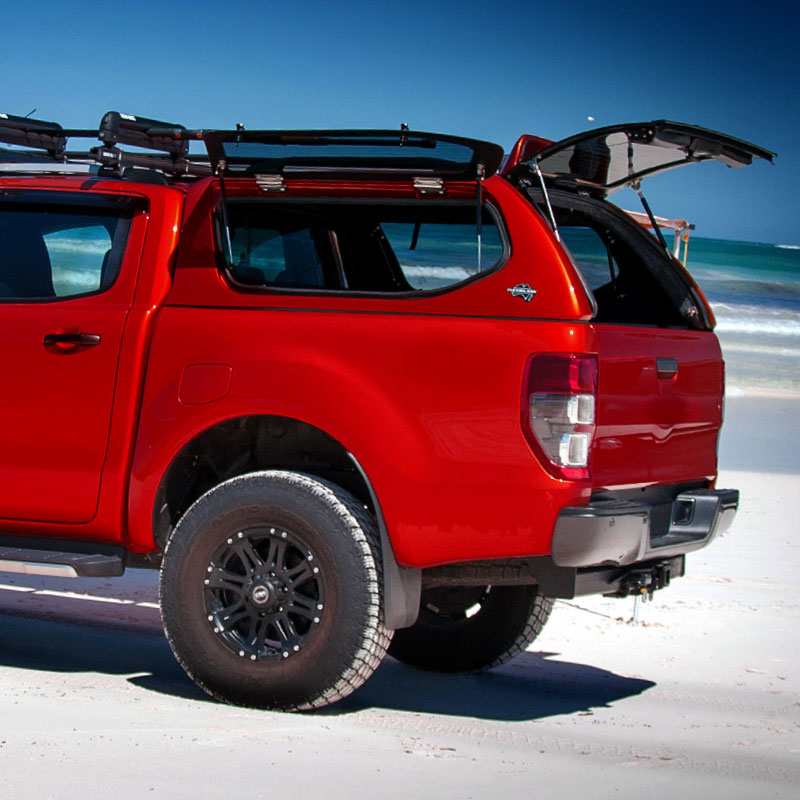"Flexiglass canopies are constructed from proven materials that are chosen for their functionality and their reliability."
Service and Maintenance Requirements
Warning: The following items must be attended to on a regular basis. More frequent for off-road conditions. Failure to comply may void your warranty.
- Lightly coat the door and window rubber assemblies with a silicon based spray during periodic cleaning
- External plastics and rubbers can be protected with a silicon based spray
- Check mounting points (clamps & bolts) after the first 1000Km, and 5000Km intervals thereafter
- Check regularly that all screws and fasteners holding windows, doors and locks are tight
- Daily checks of fasteners recommended when travelling on corrugated dirt roads
- Replace tailgate protection tape periodically to prevent paint scuffs
- Lubricate window hinges, lock mechanisms and key recesses regularly using quality grease
- Remove rear/side locking mechanism inner cover to clean and lubricate moving metal joints/parts periodically
- Gas struts are self lubricating; keep clean with a damp cloth only
- Wax the paintwork as required; do not use abrasive compounds
- Do not drive with canopy liftup windows and doors, or ute lids, in the open position, or with unsecured tray sideboards
- Do not drive with an unsecured loads
- Do not over tighten the base plate adjuster bolt on Flexiracks
- Do not overload roof racks; Roof rack ratings apply to loads spread over 2 bars evenly

Canopy Glass Care Tips
Flexiglass canopies are constructed from proven materials that are chosen for their functionality and their reliability. For this reason, Flexiglass canopies are fitted with tempered glass windows, which are both stronger and safer than conventional annealed glass windows. However, while tempered glass is stronger than annealed glass, it is not immune to damage or breakages.
A key safety feature of tempered glass is the way in which it shatters into many small pieces when it breaks, which occurs to prevent the likelihood of injury from the breakage. This shattering effect can happen immediately after a strong enough impact or, alternatively, can occur much later in what is called delayed breakage.
Canopy owners who report this type of breakage may feel their window was defective, but in fact this ‘spontaneous’ shattering was a delayed breakage from an earlier impact. Events that can lead to a delayed breakage include:
- Impact due to items stored inside the canopy.
- Surface damage caused by stone chips i.e. when towing a caravan, stones coming from the back wheels of the vehicle bounce off the caravan and hit the rear glass.
- Driving with the door or lift window open causing excessive vibration or the glass hitting against a roof load.
- Damage caused by an object hitting or scraping against the glass.
The trigger for delayed breakage could be stresses caused by:
- A change in ambient temperature i.e. hot to cold or cold to hot.
- Loose mounting clamps causing excessive vibration/movement of the canopy allowing is to move forward, exerting excessive pressure on the rear door.
- Driving over speed bumps or potholes.
To assist you with reducing the risk of glass breakages, Flexiglass recommend the following checks be performed regularly:
- All screws and fasteners holding windows, doors & locks are tight.
- Lubricate window hinges and lock mechanisms with good quality grease.
- Inspecting the glass to identify any chips or scratches.
- Clean gas struts with a damp cloth.
- Clean your canopy with a clean sponge or soft cloth and car wash detergent. Never use harsh or abrasive cleaning tools.